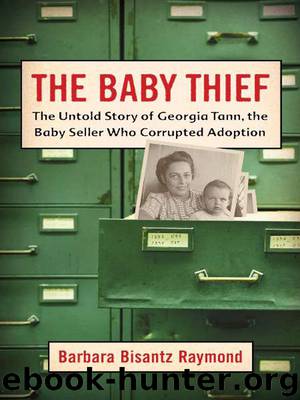The Baby Thief by Barbara Bisantz Raymond

Author:Barbara Bisantz Raymond [Raymond, Barbara Bisantz]
Language: eng
Format: epub
ISBN: 9780786719440
Publisher: Da Capo Press
Published: 2011-12-01T05:00:00+00:00
The law must be consonant with life. . . . Mankind is
possessed of no greater urge than to try to understand
the age-old question: “Who am I$”
—Judge Wade S. Weatherford Jr., SC, Seventh Judicial
Circuit Court, ruling on an adoptee’s petition to
gain access to adoption records
Part Three
Georgia’s Secrets
12.
Georgia’s Lies
When my daughter was four and beginning to understand what having been adopted meant, she reeled: she’d lost her place on earth. “Whose tummy did I grow in?” she demanded, near panic. “Was it Lynn’s, Jean’s, Susie’s, Kathy’s, Kappy’s . . . ?” She named relatives, neighbors, friends. She seemed prepared to interrogate strangers. And by the fall of her sophomore year in college she was ready to learn the answer to her question. “I’ve spent nineteen years not knowing my birth mother. I don’t want to spend more,” she said.
Finding her mother would have been difficult, maybe impossible, if Beth had been a typical American adoptee, since American adoptees are legally forbidden knowledge of their birth parents’ names. In all fifty states, adoptees’ birth certificates—which list the children’s birth names and the names of their birth mothers and, often, fathers—are sealed upon finalization of their adoptions. Their adoption records are also sealed.
Adoptees are then issued false birth certificates that portray their adoptive parents as their birth parents.
And in 1996, when my daughter was nineteen and ready to search, all states but Alaska and Kansas—which have always allowed adoptees copies of their original birth certificates once they come of age—continued to deny adoptees knowledge of their identities even after they became adults.
Adult adoptees in the other forty-eight states could learn their birth parents’ names only through the help of private investigators, search groups, or attorneys. And there was no assurance that any of these would be successful—not even the lawyers, who had to convince judges that the adoptees had “good cause” for knowledge of their roots. “Good cause” is a vague term that many judges deemed inapplicable even to grave reasons, such as the need for biologically compatible bone marrow. A Georgia Tann adoptee living in California told me of appearing before a Tennessee judge who ruled that her leukemia was insufficient reason to justify access to her health history. The adoptee later discovered that this judge had rubber-stamped many of Georgia’s illegal transactions.
The reasons that other judges withhold adoptees’ records are hopefully less self-serving than the Tennessee jurist’s, based solely upon their interpretation of their states’ adoption laws.
The reason for laws denying adoptees knowledge of their birth names and identities is said, by legislators across the country, to be to protect all members of the adoption triad: adoptees, birth parents, and adoptive parents. Issuing false birth certificates to adoptees and sealing their true ones protects them, it’s claimed, from the traumatic realization that they had been conceived out of wedlock.
Maintaining the anonymity of birth mothers is said to help them preserve their privacy and prevent them from being intruded upon years later by the children they relinquished.
Adoptive parents are depicted as needing the strongest possible assurance that their children and their birth parents will never meet.
Download
This site does not store any files on its server. We only index and link to content provided by other sites. Please contact the content providers to delete copyright contents if any and email us, we'll remove relevant links or contents immediately.
| Crime & Criminals | LGBT |
| Special Needs | Women |
We're Going to Need More Wine by Gabrielle Union(19046)
Pimp by Iceberg Slim(14508)
Bombshells: Glamour Girls of a Lifetime by Sullivan Steve(14077)
The Radium Girls by Kate Moore(12029)
Becoming by Michelle Obama(10028)
Educated by Tara Westover(8054)
The Girl Without a Voice by Casey Watson(7889)
Wiseguy by Nicholas Pileggi(5787)
Hitman by Howie Carr(5097)
The Wind in My Hair by Masih Alinejad(5095)
The Rules Do Not Apply by Ariel Levy(4970)
Hunger by Roxane Gay(4928)
On the Front Line with the Women Who Fight Back by Stacey Dooley(4873)
Year of Yes by Shonda Rhimes(4758)
The Borden Murders by Sarah Miller(4325)
Papillon (English) by Henri Charrière(4274)
Joan of Arc by Mary Gordon(4113)
American Kingpin by Nick Bilton(3887)
Patti Smith by Just Kids(3778)
